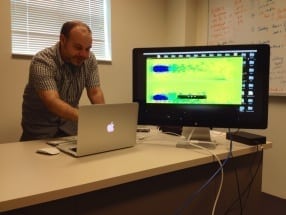New courses open door to powerful computing techniques
August 18, 2014CLEMSON, SC — Clemson University Monday announced that it has been named a CUDA® Teaching Center by NVIDIA®, the world leader in visual computing.
As a CUDA Teaching Center, Clemson University plans to expand course offerings in cutting-edge computing techniques that could help researchers tackle a variety of challenges, from finding new cures to diseases and developing more fuel-efficient cars to better understanding how the galaxy formed.
Photo: Josh Levine shows how GPUs work in his McAdams Hall office at Clemson University.
CUDA is a parallel computing platform and programming model that enables significant improvements in computing performance by harnessing the power of NVIDIA GPU accelerators.
Clemson University joins 239 recognized institutions worldwide that have integrated parallel computing techniques into their mainstream computer programming curriculum.
The benefits that come with the CUDA Teaching Center designation clear a path for Clemson’s School of Computing to offer new coursework.
Courses will be aimed at teaching faculty and industry professionals how to use computers equipped with GPU accelerators, according to Joshua Levine, an assistant professor in the School of Computing.
“Over the past two decades, there has been a shift in the way we do computing,” he said. “We’ve hit a wall with your standard computer. The CPU can only go so fast. GPUs can really take us to the next level.”
GPU accelerators enable increases in application performance by enabling a large number of calculations to be processed at the same time, or “in parallel.” A problem that might take a standard CPU-based computer days can be finished in minutes, or even seconds, with a GPU, Levine said.
The CUDA Teaching Center designation strengthens ties between the university and NVIDIA, which is based in Santa Clara, California. NVIDIA previously named the School of Computing a CUDA Research Center in 2010 in recognition of its innovative use of GPU-accelerated computing across a number of research fields.
University courses will target researchers and professionals whose primary expertise lies outside computing, Levine said. Those who work in hard sciences stand to benefit most, he said. For example, automotive engineers can use the computing techniques to analyze air flow over cars. The techniques could also help scientists sequence genes, understand climate change and analyze patterns on social media sites, such as Twitter.
“We already have a good course base,” Levine said. “The question is where do we take that course base now? That’s what this proposal is about.”
“Clemson University was recognized as a CUDA Teaching Center based on its commitment to advancing the state of parallel programming education using CUDA C/C++,” said David Luebke, distinguished inventor and senior director of research at NVIDIA. “We look forward to working with Clemson to help educate new generations of parallel computing experts.”
As a CUDA Teaching Center, Clemson University will have access to NVIDIA GPU hardware and NVIDIA parallel programming experts and resources, including educational webinars, an array of teaching materials, and access to the NVIDIA CUDA Cloud Training Program.
In exchange, Clemson will include CUDA C/C++ as a substantial part of the curriculum, participate in the GPUComputing.net forum, provide CUDA training to members of the university community and send NVIDIA recommendations on how to improve course materials.
Eileen Kraemer, the C. Tycho Howle Director of the School of Computing, said the collaboration between Clemson and NVIDIA illustrates how universities and industry can work together.
“It’s great to build a collaboration with NVIDIA,” she said. “They have been very generous. We are grateful and excited about where it could lead. This is going to change the way some researchers do science.”
Robert Geist and Melissa Smith are co-principal investigators on the proposal. It is a joint enterprise between the School of Computing and the Holcombe Department of Electrical and Computer Engineering.
An introductory course in GPU programming is being offered this fall with Geist teaching.




















